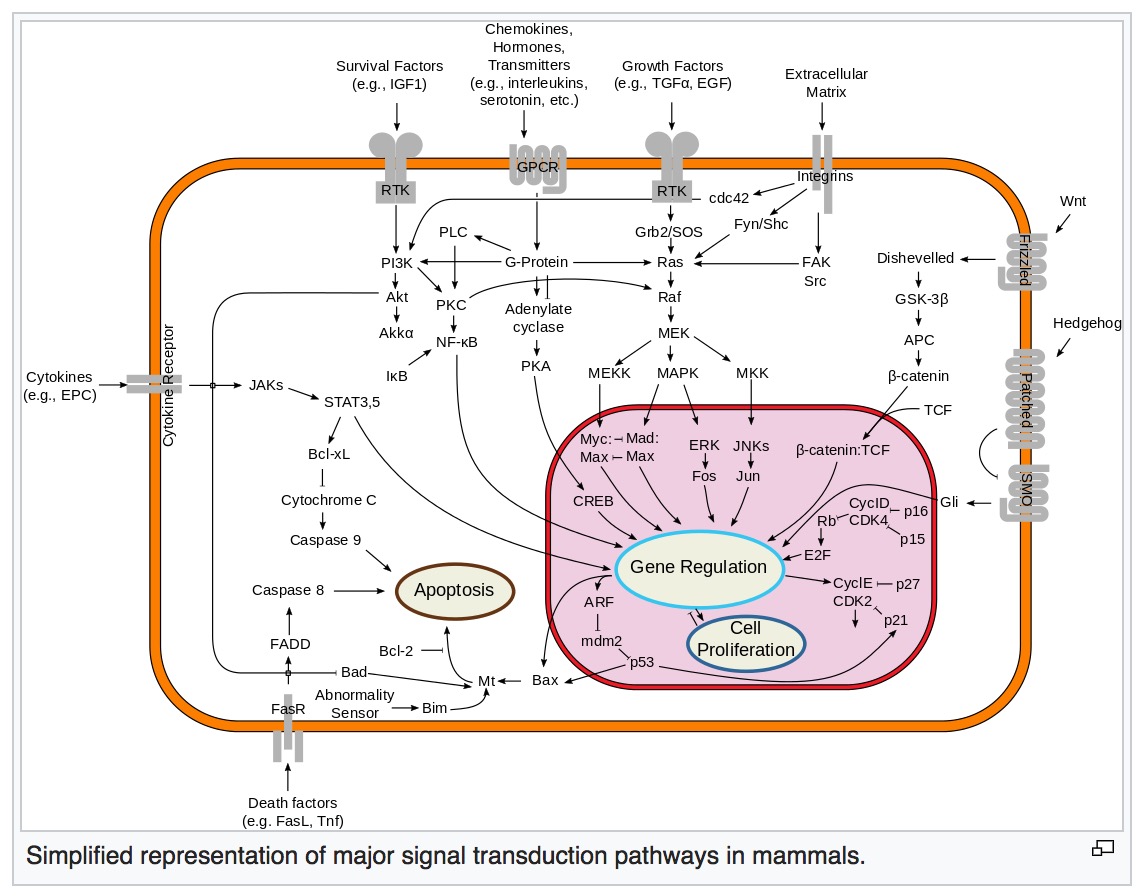β-catenin
β-catenin is a multifunctional protein that plays a critical role in various cellular processes, including cell-cell adhesion and signal transduction. It is a key component of the Wnt signaling pathway, which is essential for regulating cell fate, migration, and proliferation during development. β-catenin also plays a central role in the maintenance of adherens junctions, where it binds to cadherins to help form the connection between adjacent cells.
In the context of the Wnt signaling pathway, β-catenin is involved in the regulation of gene expression. When Wnt signaling is active, β-catenin accumulates in the cytoplasm and translocates to the nucleus, where it binds to T-cell factor/lymphoid enhancer-binding factor (TCF/LEF) transcription factors to initiate the expression of target genes that regulate cell proliferation and differentiation.
In cancer biology, aberrant activation of the Wnt/β-catenin pathway is commonly observed, leading to uncontrolled cell growth. Mutations that stabilize β-catenin or disrupt the degradation process can result in its accumulation and abnormal activation of downstream target genes, contributing to tumorigenesis, especially in cancers like colorectal cancer.
Catenin (cadherin-associated protein), beta 1, 88kDa (the HUGO-approved official symbol, CTNNB1; HGNC ID, HGNC:2514), also called beta-catenin (or β-catenin), is a dual function protein, regulating the coordination of cell–cell adhesion and gene transcription. In humans, the CTNNB1 protein is encoded by the CTNNB1 gene.
Beta catenin is a subunit of the cadherin protein complex and acts as an intracellular signal transducer in the Wnt signaling pathway.
Beta catenin is a well-known crucial factor in astrocytoma progression and it is involved in aquaporin 1 (AQP1) mediated cell migration.
In a study, Zhang et al. revealed the function of AQP1 in astrocytoma progression and provided the first clinical evidence that AQP1 expression was positively correlated with β-catenin. Furthermore, they proved the functional role of AQP1/β-catenin pathway in astrocytoma progression. More importantly, they discovered that combination of AQP1 and β-catenin expression was an independent prognosis factor for astrocytoma patients and it was a better survival predictor than either AQP1 or β-catenin alone. In conclusion, the study provided a novel more precise prognostication for predicting astrocytoma prognosis based on combinatorial analysis of AQP1 and β-catenin expression 1).
It is a member of the catenin protein family and homologous to γ-catenin.
Mutations and overexpression of β-catenin are associated with many cancers, including hepatocellular carcinoma, colorectal carcinoma, lung cancer, malignant breast tumors, ovarian and endometrial cancer.
β-catenin is regulated and destroyed by the beta-catenin destruction complex, and in particular by the adenomatous polyposis coli (APC) protein, encoded by the tumour-suppressing APC gene. Therefore genetic mutation of the APC gene is also strongly linked to cancers, and in particular colorectal cancer resulting from familial adenomatous polyposis (FAP).
Wnt/β-catenin signaling pathway is frequently dysregulated in human tumors and plays a critical role in tumorigenesis; however, the roles of microRNAs in mediating Wnt/β-catenin pathway are not well understood.
Expression of WNT3a, cytoplasmic β-catenin and TCF4 was significantly associated with the histological malignancy grade and with a worse prognosis for patients with glioma 2).
